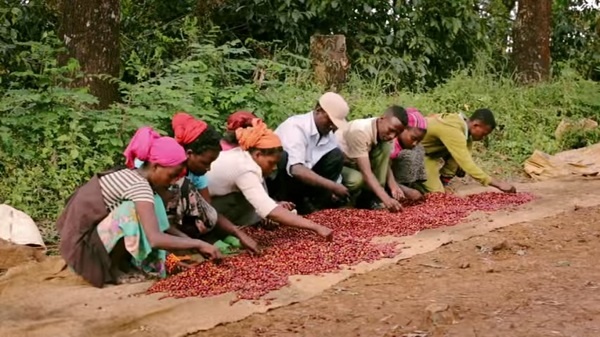
HAMBURG (ICP) – The pre-competitive initiative International Coffee Partners (ICP) extends project work to Ethiopia. The “Coffee Alliances for Ethiopia” (CAFE) project is co-financed by the Austrian Development Agency (ADA), the operational unit of Austrian Development Cooperation, and will improve the economic situation and well-being of smallholder coffee farmer families in Ethiopia’s Amhara region. Until August 2023 it will reach 2,500 smallholder families.
“Being active in neighboring Uganda since 2005 and Tanzania since 2010, ICP brings a broad range of experiences and learnings to Ethiopia,” says Kathrine Löfberg, Chairperson of ICP. The project supports the setup of efficient, inclusive farmer organizations, upgrading the farming systems and their resilience to climate change, food and nutrition security as well as increased gender equality. “For the households, coffee production represents an important source of income,” says Kathrine Löfberg. “In terms of productivity we aim to raise this until August 2023 by 40% per hectare on average compared to the baseline.” The project will be implemented by the independent non-profit Hanns R. Neumann Stiftung (HRNS), ICP’s trusted implementing partner, which is active in Ethiopia’s coffee regions since 2014. “Besides the work on the household level, we will work with a total number of 71 Farmer Field Schools – FFS,” says Desalegn Eyob, Country Manager of HRNS in Addis Ababa. “FFS sessions cover about 20 topics which depend on the seasonal crop calendar. Also, our experiences with the HRNS Gender Household Approach will be utilized by training change agent couples to promote joint household decision making in the communities.”
“Our ultimate goal is to combat poverty on a global scale”, emphasizes ADA’s managing director Martin Ledolter. “The partnership with International Coffee Partners and Hanns R. Neumann Stiftung helps us to get significantly closer to that goal in one of the poorest regions in Ethiopia. An estimated 15,000 people will live better lives thanks to more efficient and climate-resilient cultivation methods, and thanks to the increased incomes they will be able to generate. I am particularly grateful that our cooperation also addresses gender inequality: Together, we are making sure that women and men have the same access to natural resources. And we especially encourage women to take up leadership positions in farming associations.”
- Also read: Ethiopia and IFAD to help families adapt to climate shocks in new multi-million dollar project
The Amhara region will benefit from the Coffee Alliances for Ethiopia project by demonstrating how coffee production can be developed as part of diversified farming systems which are sustainable and profitable. “The project follows a holistic approach and addresses coffee as an element of farmer families’ livelihood,” says Michael Opitz, Managing Director at HRNS. Ethiopia is the largest coffee producer in Africa. Approximately 2.2 million smallholder families are engaged in coffee production with coffee as their main cash crop. Many of these smallholder farmers face a range of economic, social and environmental problems which threaten their livelihoods and jeopardize the development of the individual farms. With the new project intervention, ICP builds upon experiences made during the Coffee Alliances for Ethiopia project phase one implemented since 2014 in the Region. Co-financed by the Austrian Development Agency, The Löfberg Family Foundation, Lavazza Foundation and Hanns R. Neumann Stiftung (HRNS), it reached 2,500 smallholder families, supported 10 Farmer Organizations and set up one Union.
About International Coffee Partners
International Coffee Partners (ICP) is a pre-competitive initiative of the leading European family-owned coffee companies, Delta Cafés of Portugal, Franck of Croatia, Paulig of Finland, Joh. Johannson Kaffe of Norway, Löfbergs of Sweden, Lavazza of Italy, Neumann Gruppe of Germany and Tchibo of Germany. ICP’s objective is to contribute know-how to establish a sustainable coffee sector in key producing countries through the implementation of best-practice projects in coffee farmer communities. Since 2001, ICP has reached more than 80,000 smallholder families in 12 countries.
About Austrian Development Agency
The Austrian Development Agency (ADA), the operational unit of Austrian Development Cooperation, supports countries in Africa, Asia, Southeast- and Eastern Europe in their sustainable development efforts. Together with public institutions, non-government organizations and businesses, ADA currently implements projects and programs with a total volume of EUR 500 million.
Source: International Coffee Partners
